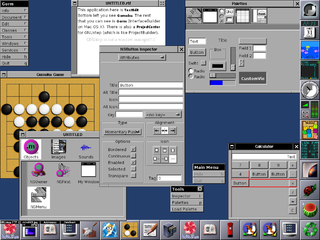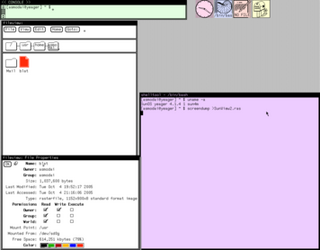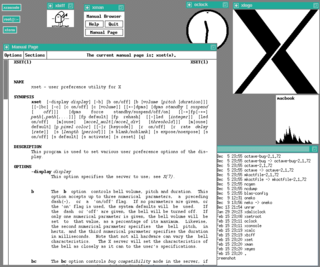Related Research Articles

Cygwin is a POSIX-compatible programming and runtime environment that runs natively on Microsoft Windows. Under Cygwin, source code designed for Unix-like operating systems may be compiled with minimal modification and executed.
An integrated development environment (IDE) is a software application that provides comprehensive facilities to computer programmers for software development. An IDE normally consists of at least a source code editor, build automation tools and a debugger. Some IDEs, such as NetBeans and Eclipse, contain the necessary compiler, interpreter, or both; others, such as SharpDevelop and Lazarus, do not.

The X Window System is a windowing system for bitmap displays, common on Unix-like operating systems.
OpenStep is a defunct object-oriented application programming interface (API) specification for a legacy object-oriented operating system, with the basic goal of offering a NeXTSTEP-like environment on non-NeXTSTEP operating systems. OpenStep was principally developed by NeXT with Sun Microsystems, to allow advanced application development on Sun's operating systems, specifically Solaris. NeXT produced a version of OpenStep for its own Mach-based Unix, stylized as OPENSTEP, as well as a version for Windows NT. The software libraries that shipped with OPENSTEP are a superset of the original OpenStep specification, including many features from the original NeXTSTEP.
Cocoa is Apple's native object-oriented application programming interface (API) for its desktop operating system macOS.

GNUstep is a free software implementation of the Cocoa Objective-C frameworks, widget toolkit, and application development tools for Unix-like operating systems and Microsoft Windows. It is part of the GNU Project.
HyperTalk is a discontinued high-level, procedural programming language created in 1987 by Dan Winkler and used in conjunction with Apple Computer's HyperCard hypermedia program by Bill Atkinson. Because the main target audience of HyperTalk was beginning programmers, HyperTalk programmers were usually called "authors" and the process of writing programs was known as "scripting". HyperTalk scripts resembled written English and used a logical structure similar to that of the Pascal programming language.
In computing, cross-platform software is computer software that is designed to work in several computing platforms. Some cross-platform software requires a separate build for each platform, but some can be directly run on any platform without special preparation, being written in an interpreted language or compiled to portable bytecode for which the interpreters or run-time packages are common or standard components of all supported platforms.

In computer science, inter-process communication or interprocess communication (IPC) refers specifically to the mechanisms an operating system provides to allow the processes to manage shared data. Typically, applications can use IPC, categorized as clients and servers, where the client requests data and the server responds to client requests. Many applications are both clients and servers, as commonly seen in distributed computing.

OPEN LOOK is a graphical user interface (GUI) specification for UNIX workstations. It was originally defined in the late 1980s by Sun Microsystems and AT&T Corporation.
In computing, a directory service or name service maps the names of network resources to their respective network addresses. It is a shared information infrastructure for locating, managing, administering and organizing everyday items and network resources, which can include volumes, folders, files, printers, users, groups, devices, telephone numbers and other objects. A directory service is a critical component of a network operating system. A directory server or name server is a server which provides such a service. Each resource on the network is considered an object by the directory server. Information about a particular resource is stored as a collection of attributes associated with that resource or object.

SunView is a discontinued windowing system from Sun Microsystems developed in the early 1980s. It was included as part of SunOS, Sun's UNIX implementation; unlike later UNIX windowing systems, much of it was implemented in the system kernel. SunView ran on Sun's desktop and deskside workstations, providing an interactive graphical environment for technical computing, document publishing, medical, and other applications of the 1980s, on high resolution monochrome, greyscale and color displays.

OpenWindows is a discontinued desktop environment for Sun Microsystems workstations which combined SunView, NeWS, and X Window System protocols. OpenWindows was included in later releases of the SunOS 4 and Solaris operating systems, until its removal in Solaris 9 in favor of Common Desktop Environment (CDE) and GNOME 2.0.
Remote administration refers to any method of controlling a computer from a remote location. Software that allows remote administration is becoming increasingly common and is often used when it is difficult or impractical to be physically near a system in order to use it. A remote location may refer to a computer in the next room or one on the other side of the world. It may also refer to both legal and illegal remote administration.
In computing, D-Bus is a message-oriented middleware mechanism that allows communication between multiple processes running concurrently on the same machine. D-Bus was developed as part of the freedesktop.org project, initiated by Havoc Pennington from Red Hat to standardize services provided by Linux desktop environments such as GNOME and KDE.

In computing, a shell is a computer program that exposes an operating system's services to a human user or other programs. In general, operating system shells use either a command-line interface (CLI) or graphical user interface (GUI), depending on a computer's role and particular operation. It is named a shell because it is the outermost layer around the operating system.
Caldera OpenLinux (COL) is a defunct Linux distribution. Caldera originally introduced it in 1997 based on the German LST Power Linux distribution, and then taken over and further developed by Caldera Systems since 1998. A successor to the Caldera Network Desktop put together by Caldera since 1995, OpenLinux was an early "business-oriented distribution" and foreshadowed the direction of developments that came to most other distributions and the Linux community generally.
A home server is a computing server located in a private computing residence providing services to other devices inside or outside the household through a home network or the Internet. Such services may include file and printer serving, media center serving, home automation control, web serving, web caching, file sharing and synchronization, video surveillance and digital video recorder, calendar and contact sharing and synchronization, account authentication, and backup services.

K Desktop Environment 3 is the third series of releases of the K Desktop Environment. There are six major releases in this series. After the release of KDE 4, version 3.5 was forked into the Trinity Desktop Environment.

Unix is a family of multitasking, multiuser computer operating systems that derive from the original AT&T Unix, whose development started in 1969 at the Bell Labs research center by Ken Thompson, Dennis Ritchie, and others.
References
- ↑ Julienne, Astrid M. and Holtz, Brian ToolTalk and Open Protocols: Inter-Application Communication (1994)